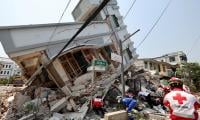Thousands of protesters blocked major highways in Lebanon and burnt tyres for a second day on Friday as dozens of people were injured in clashes with security forces that threatened the country’s fragile coalition government.
Demonstrators have taken to the streets in protest at corruption and proposed tax hikes, with many calling for an overhaul of Lebanon’s sectarian system and voicing contempt for their leaders.
Under-fire Prime Minister Saad Hariri was expected to give an address later Friday about the protests sparked by a proposed new tax on users of WhatsApp and other messaging applications.
At lunchtime, hundreds of demonstrators had brought central Beirut to a standstill. With smoke from burning tyres around them, protesters flew the Lebanese flag and chanted ‘The people demand the fall of the regime,’ a popular refrain from the Arab Spring uprisings of 2011.
Yara, a 23-year-old graduate, said she joined up because the protests were not sectarian. "For once people are saying it doesn’t matter the religion, it doesn’t matter which political party you are following," she told AFP.
"Today what matters is that all of the Lebanese people are protesting together." Lebanon, which was devastated by a 15-year civil war that ended in 1990, maintains a complicated political system based on balancing influence between Christians, Sunni and Shia Muslims and other religious groups.
The current unity government is backed by politicians from across the political spectrum but has been hampered by a financial crisis. Public anger has simmered since parliament passed an austerity budget in July to help trim a ballooning deficit.
Tempers boiled over Thursday over plans to introduce a $0.20 tax on calls on messaging applications such as WhatsApp, which are widely used in Lebanon. The government scrapped the proposal within hours but the demonstrations carried on into the early hours of Friday.
Security forces finally dispersed them shortly before dawn, firing volleys of tear gas and rubber bullets after they had tried to storm government headquarters. The National News Agency (NNA) said two foreign workers choked to death early Friday after they were trapped in a building set alight by rioters. Some reports said the two men were Syrians.
So far at least 23 protesters, according to the Red Cross, and 60 security force personnel, according to police, have been injured. Banks, state institutions, schools and universities were closed on Friday as the demonstrations spread throughout the country.
Protesters also burned pictures of Hariri in the northern city of Tripoli, where he is influential, and others protested near Beirut against President Michel Aoun. Sami Nader, director of the Levant Institute for Strategic Affairs think-tank, said the protests were "totally spontaneous" and appeared to be against the entire political class. "The protests are a result of a piling up of grievances, resulting mainly from government mismanagement," he said.
They are the largest demonstrations since a 2015 refuse collection crisis sparked widespread anti-government protests. Residents suffer from constant electricity shortages and poor internet. "I want the streets to be lit. I don’t want to hear any more generators," Dima Abu Hassan, 42, said. "Start there -- at least some infrastructure."
The government has also come under heavy criticism over its response to forest fires. In a country with one of the world’s highest debt burdens, the government is weighing a raft of belt-tightening measures it hopes will shore up finances and secure $11 billion in aid pledged by international donors last year.
It is expected to announce a series of new taxes as part of next year’s budget, which is currently being drawn up by ministers. The demonstrations come at a time of deep divisions within the government over a raft of issues, including not only the economic reform package, but also the allocation of public sector positions and rapprochement with the resurgent Syrian government.
Growth in Lebanon has plummeted in the face of repeated political deadlock in recent years, compounded by the impact of eight years of war in neighbouring Syria. "Most high-frequency indicators point towards a continuation of weak growth in 2019," the International Monetary Fund said on Thursday.
Lebanon’s public debt stands at around $86 billion -- more than 150 percent of gross domestic product -- according to the finance ministry. Last month, banks and money exchange houses rationed dollar sales, sparking fears of a devaluation of the Lebanese pound.
Monsoon clouds loom over the overflowing river Yamuna, in New Delhi, India, July 15, 2023. — Reuters PARIS: Can...
Members of the Texas National Guard stand guard near the border wall between Mexico and the United States, as seen...
Iwao Hakamada, 88, leaves home for his daily stroll in Hamamatsu, central Japan September 26, 2024, 2024, in this...
Spokesperson for Matsamo CPA Bernard Shabangu poses for a photograph near their offices in the Kaalrug area south-east...
A Saudi tailor showing an Arabian robe made by him. — AFP/File Hofuf : Saudi tailor Habib Mohammed´s shop once...







